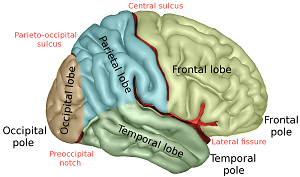Alzheimer's disease (AD): Types and Causes
Alzheimer's disease (AD), also referred to simply as Alzheimer's, is a chronic neurodegenerative disease that usually starts slowly and worsens over time. It is the cause of 60% to 70% of cases of dementia
source
Alzheimer's disease is a type of brain dementia that's usually terminal and what's interesting about it is that the rate of which the person declines or the progression of the disease is usually quite variable. The early signs of Alzheimer's are:
- Short-term memory loss and difficulty in attaining new Information.
- Decreased abstract thinking, mental flexibility, planning abilities: Patients can't plan things as well, they lose what's called executive function in their life.
- Decline in fine motor skills, handwriting starts to decline significantly or the ability to dress oneself.
 image source
image sourceAs the disease progresses, you see the more obvious signs like confusion, disorientation personality changes with sometimes irritability or aggression, uncharacteristic mood changes. The person has trouble with language then their long-term memory starts to go and of course this can sometimes involve not even recognizing familiar people in a person's life including their own family members.
Gradually, there's a decline in bodily functions which often leads to death, the average survival time once a person is diagnosed with Alzheimer's is about 7 years, only three percent of people are alive fourteen years later.
How common is the problem?
In 2015, there were approximately 29.8 million people worldwide with AD. It most often begins in people over 65 years of age, although 4% to 5% of cases are early-onset Alzheimer's which begin before this. It affects about 6% of people 65 years and older. In 2015, dementia resulted in about 1.9 million deaths. It was first described by, and later named after, German psychiatrist and pathologist "Alois Alzheimer" in 1906. In developed countries, AD is one of the most financially costly diseases.
source
Age is a major risk factor but the other thing is this, after age 65, 10 to 20% percent of people also have just mild cognitive impairment, they don't have Alzheimer's or a serious dimension but they're already losing cognitive abilities.
From age 85 and above, your chances of having Alzheimer’s disease is high.
Types of Alzheimer's disease
There are three different types of Alzheimer's disease:
Classical Alzheimer's disease: where you get memory loss because you lose the memory chemical, classic signs in the brain of what's called amyloid plaque buildup and neurofibrillary tangles in the nerve cells.
Vascular dementia: This can occur when you clog your arteries up with too much fat and cholesterol, your homocysteine levels are too high. This is more modifiable if you keep your cholesterol down and do the right things for your cardiovascular system, you're going to be less prone to get vascular dementia and often with vascular, dementia there's some mini strokes that occur along the way sometimes that are occurring without people realizing.
Mixed: Mixed form of dementia is where you have a combination of sort of classical Alzheimer's and vascular dementia.
On the large macroscopic level, what's happening in the brain and Alzheimer's disease when you starve, nerve cells are dying and the connections between nerve cells, the synapses are sort of falling off so the transmission of nerve information starts to drop and with that, you're getting a shrinking of some of the key brain centers like the temporal lobe, parietal lobe and the frontal lobe where a lot of sort of cognitive function occurs as well as an area called the cingulate gyros.
What's fascinating to me is what happens at a microscopic level right in the nerve cell itself. Nerve cells stop producing optimal amounts of a memory chemical called acetylcholine, this happens in every one of us as we get older we make less acetylcholine.
In Alzheimer's, you're seeing this buildup of protein plaque around the nerve cells called amyloid plaque and inside the nerve cell eventually, certain structures break down that lead to what are called neurofibrillary tangles.
Causes of Alzheimer's disease
High blood sugar levels and obesity are strongly linked as an increased risk of developing Alzheimer's as a person gets older. As your blood sugar rises, and as it sugarcoat certain proteins and affects your insulin levels in your brain and that can damage nerve cells in a way that's linked to Alzheimer's.
Being overweight causes insulin resistance and sugar irregularities, Obesity is linked to Alzheimer's.
What's the genetic link with Alzheimer's disease?
Only about 1 – 2% of Alzheimer's cases seem to be strongly genetically based. The biggest risk factor is getting older, so as you age, the risk is greater.
Sources: 1 - 2
References: 1 - 2 - 3

Thanks to @camzy & @samstickkz for this amazing toon.



Important information. Have you heard the latest research showing that AD is actually a form of diabetes? They are calling it diabetes III, and relating it to sugar consumption. Makes a lot of sense. Upvoted!